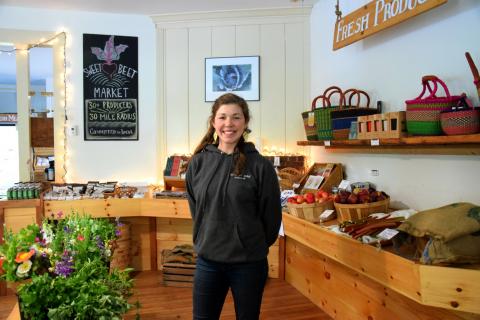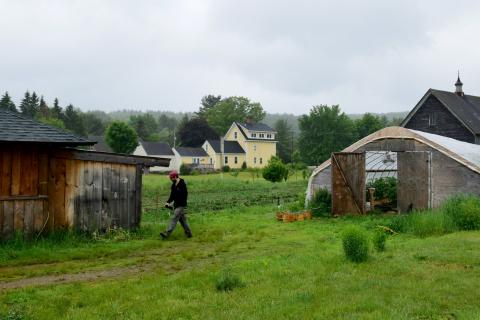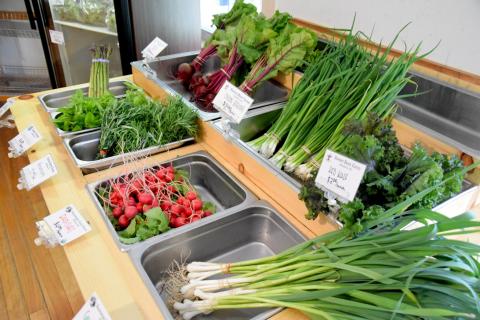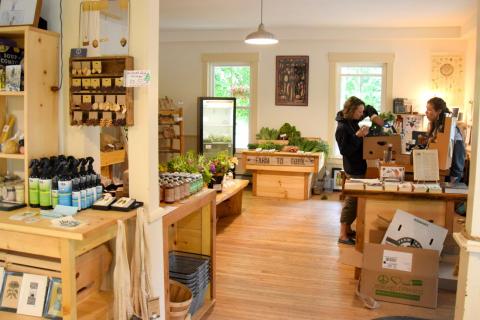Strong Community Benefits Come from Local Food Education at Kearsarge Food Hub

Hanna Flanders, a co-founder of Kearsarge Food Hub, stands in their local food marketplace Sweet Beet Market. Photo by Emily Vaughn.
At Kearsarge Food Hub, developing opportunities for community members to learn about local food and its benefits is integrated into every aspect of the business. The founders recognize the power of education in everything they do.
As Hanna puts it, “By keeping it local, you get to witness the flow of food from start to finish.”
With the arrival of COVID-19 and the onset of climate change, it is increasingly apparent that having resilient local food systems will be key to sustaining the health of our communities, economies, and the environment. It is crucial to invest in educational opportunities for consumers to learn more about local food options, as well as for farmers to to learn how to adapt their farming practices to endure future disruptions. Since the start, Hanna and her colleagues have been devoted to offering quality food and farm education to individuals at all ages. Their programs have sparked community-wide interest in environmental issues and growing food.

Celebrating their 5th anniversary this year, the food hub has been able to expand their operations rapidly and is now a popular local fixture in Bradford, NH and the surrounding area. Photo by Emily Vaughn.
Kearsarge Food Hub offers farm-to-school programs to K-12 students in the region. Each year, Bradford first graders engage in gardening activities with the Food Hub; students visit to sample cherry tomatoes and have the opportunity to plant vegetables. At the end of the year, they are rewarded with their own harvest to serve at their school’s end-of-the-year field day. The students learn about where their food comes from, how it grows, and its nutritional value.
“I would say that over half of the kids have had experience with gardening when they’re in first grade,” Hanna explains, “which I think is great. And they’re just bursting at the seams to tell us about the things that their grandma grows or their mom grows… And every single one of them is curious and open to tasting anything in the garden, which I think is amazing. And if at the beginning of the class over half of them have had experience with gardening, at the end of the class, all of them say that they want to grow more food.”
The food hub also engages older students at John Stark Regional High School with approachable, hands-on lessons.
Hanna describes the program — “John Stark has an equity program for kids who don’t do that great in traditional classroom settings. So they come and do community service on the farm in the spring. And in the fall, they usually do about three to four visits, and everyone lights up when they’re on the farm. It’s so amazing to see these kids who you can tell they just don’t like school, but they like being outside and they learn a lot from being in the garden.”

By offering a wide variety of educational opportunities, Kearsarge Food Hub expands people’s connection to the food system. Photo by Emily Vaughn.
At the college level, the food hub works with students at Colby-Sawyer College who are passionate about sustainable agriculture and have access to knowledge that could change how we think about growing food. A recent group of students worked with the food hub on developing a way to heat a greenhouse with compost instead of propane. Through the program, the food hub explored an opportunity to cut energy costs, while students learned more about an important sustainable agriculture technique and about agricultural career opportunities.
The bottom line, Hanna says, is “We’re showing them that it’s also a career. And it’s also important for everyone to know where their food is coming from and how you might do that on a little bit of a larger scale to satisfy things like Sweet Beet Market.”
Farm-to-school programs like this allow students to get academic experience that is equally as valuable as learning through classroom lectures. The hands-on opportunity to grow their own crops and learn about the advantages of a strong local food system gives a new perspective not found in a traditional classroom.

Sweet Beet Market, the storefront for Kearsarge Food Hub, used to be a temporary farm stand but moved to their current permanent location on Main Street in Bradford in 2017. Photo by Emily Vaughn.
The Food Hub also actively engages the community to support local food awareness. By hosting their own events like farmers’ market pop-ups, the food hub invites community members to learn about local food and taste the benefits for themselves. Beyond the Kearsarge area, Hanna and her co-founders attend conferences, like the NH Food Alliance’s Statewide Gathering and the Slow Living Summit to help expand their reach and learn from others. Through these efforts, the Kearsarge Food Hub goes above and beyond to communicate with others. By establishing a broader connection with key partners, the Food Hub strengthens community-wide demand.
Leaders like Kearsarge Food Hub, that spark passion and enthusiasm within people to learn about their food options and where their food comes from, are vital. COVID-19 has demonstrated the cracks in our food system but has also revived interest in getting back to our roots by eating locally. With greater awareness of food options, fueled by the kind of educational programs offered by Kearsarge Food Hub, communities across the state can weather any storm. The future of our food system depends on it.
Kearsarge Food Hub | @kearsargefoodhub
Colby-Sawyer College | @colbysawyercollege
Sweet Beet Market | @sweetbeetmarket
Slow Living Summit | @slowlivingsummit


